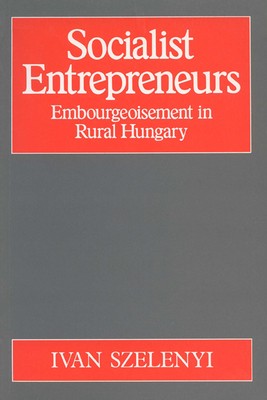
- We will send in 10–14 business days.
- Author: Ivan Szelenyi
- Publisher: University of Wisconsin Press
- ISBN-10: 0299113647
- ISBN-13: 9780299113643
- Format: 15.2 x 22.9 x 1.5 cm, softcover
- Language: English
- SAVE -10% with code: EXTRA
Reviews
Description
Among the East European nations, Hungary has been noted in recent years for permitting, even encouraging, family entrepreneurship in agriculture. In this highly empirical study, Ivan Szelenyi and his collaborators explore this phenomenon, affording a rare view of the reemergence of private sector activity in a socialist society, and offering new insights into the very origins of capitalism.
In the years since the government relaxed its policy of forced collectivization, approximately ten percent of rural Hungarian families have taken up entrepreneurial opportunities in agriculture. Why they have chosen this course--and why ninety percent of family have chosen to remain in proletarian or cadre positions--are central questions in Szelenyi's inquiry.
The theory advocated here is one of "interrupted embourgeoisement." Those people who, during the years of Stalinism, found occupations in which they could successfully resist the dual pressures of proletarianization and cadrefication are the ones now able to reenter the interrupted embourgeoisement trajectory. As a result, the communist "revolution from above" has been challenged by a somewhat unexpected "revolution from below," in the process producing a socialist mixed economic system that seems to be as different from Soviet--style communism as it is from Western capitalism.
EXTRA 10 % discount with code: EXTRA
The promotion ends in 20d.08:37:16
The discount code is valid when purchasing from 10 €. Discounts do not stack.
- Author: Ivan Szelenyi
- Publisher: University of Wisconsin Press
- ISBN-10: 0299113647
- ISBN-13: 9780299113643
- Format: 15.2 x 22.9 x 1.5 cm, softcover
- Language: English English
Among the East European nations, Hungary has been noted in recent years for permitting, even encouraging, family entrepreneurship in agriculture. In this highly empirical study, Ivan Szelenyi and his collaborators explore this phenomenon, affording a rare view of the reemergence of private sector activity in a socialist society, and offering new insights into the very origins of capitalism.
In the years since the government relaxed its policy of forced collectivization, approximately ten percent of rural Hungarian families have taken up entrepreneurial opportunities in agriculture. Why they have chosen this course--and why ninety percent of family have chosen to remain in proletarian or cadre positions--are central questions in Szelenyi's inquiry.
The theory advocated here is one of "interrupted embourgeoisement." Those people who, during the years of Stalinism, found occupations in which they could successfully resist the dual pressures of proletarianization and cadrefication are the ones now able to reenter the interrupted embourgeoisement trajectory. As a result, the communist "revolution from above" has been challenged by a somewhat unexpected "revolution from below," in the process producing a socialist mixed economic system that seems to be as different from Soviet--style communism as it is from Western capitalism.


Reviews